2/27/2006
We should build bridges instead of walls - the alliance of the moderates
 Yesterday I went to a very interesting debate in the Melkweg in Amsterdam about the Danish cartoons, organised by Happy Chaos and www.marokko.nl.
Yesterday I went to a very interesting debate in the Melkweg in Amsterdam about the Danish cartoons, organised by Happy Chaos and www.marokko.nl.The speakers were:
- Imam Abdulwahid van Bommel
- Thomas von der Dunk (publicist/columnist)
- Michiel Vliek (social psychologist)
- Ahmed Aboutaleb (Amsterdam city councillor)
- Tarik Yousef (Amsterdam broadcasting company AT 5)
- Nan van Houte (Director of Frascati and De Brakke Grond Theatres)
- Mohammed Cheppih (former president of the World Muslim Liga)
- Paul Scheffer (publicist and member of the Labour Party (PvdA))
It was a very good mixture of different positions and they succeeded very well in their aim to create a constructive dialogue, instead of a simplistic irrational one, which is not very useful.
The views I disagreed with most were from Paul Scheffer. But at the same time I could see that his arguments were well founded, he has a different position than I, but he knows well how he can defend his position, that makes the discussion interesting.
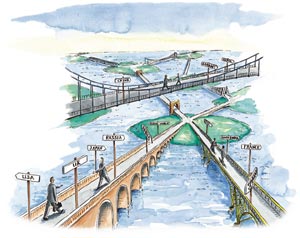 One of the most important conclusions of the debate was that the riots about the cartoons are in fact not really about whether it is allowed in the Islam to make images of the Prophet (as a terrorist) or about if religious insults should be forbidden by law or not. The core of the issue is about "exclusion". When a group, a minority in a pluriform society, feels excluded, they become angry. The anger coming from the east is something else of course. We agreed mostly that extremist leaders in the east should not decide for the West what kind of drawings can be made there and what not.
One of the most important conclusions of the debate was that the riots about the cartoons are in fact not really about whether it is allowed in the Islam to make images of the Prophet (as a terrorist) or about if religious insults should be forbidden by law or not. The core of the issue is about "exclusion". When a group, a minority in a pluriform society, feels excluded, they become angry. The anger coming from the east is something else of course. We agreed mostly that extremist leaders in the east should not decide for the West what kind of drawings can be made there and what not.Many speakers focussed on the problem of exclusion, which is at the same time the central theme of my dissertation. I especially found the explanation that the social psychologist gave of these mechanisms of exclusion very good. He referred to the book "In every human being a terrorist is hidden". He said that terrorists are no exceptional crazy people, they show "normal" behaviour in exceptional situations. Humans always want to understand the complex surroundings in which they live and they try to predict the behaviour of the people around them. In order to do so, to create a predictive model, they make simplifications. But in reality human behaviour is very difficult to predict, and through their simplications, people make mistakes, they assume things which aren't true. We put the people around us into simple categories, so we can clearly define and place them. In this we we ascribe the behaviour and the attitudes of people to their personality / background / group characteristics, not to the circumstances in which these people find themselves. Then people use rough-and-ready rules to make their judgements about these categories. People start to distinguish between "us" and "them", between the good in-group and the bad out-group. The way people make simplistic judgements about individuals, they also start to make judgements about masses. The images that arise like this contain many biases.
One example of the bias in judgements with regard to the in-group and the out-group:
- Positive behaviour of the in-group is being ascribed to the characteristics of that group (our behaviour is good because we are good people)
- Negative behaviour of the in-group is ascribed to external factors which they can't influence (it went badly but we cannot help that, it was due to negative circumstances)
- Positive behaviour of the out-group is being ascribed to the situation that arose by accident
- Negative behaviour is ascribed to the negative characteristics of that group
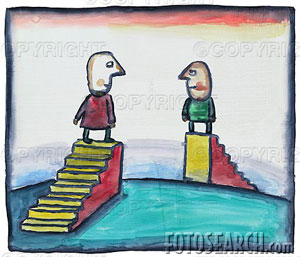 To stop this process of growing polarisation and growing hate at both sides, Michiel Vliek said that he thought it would be wise to stop publishing this kind of offensive cartoons, at least for a while, to stop putting oil on the fire. He said that freedom of speech is usually considered to be so important because we want to have a real democracy in which every voice can be heard. But when the polarisation grows, this also makes it more difficult for certain voices to be heard. Polarisation means that people start to shout harder and that the extremists are being heard more than moderate people.
To stop this process of growing polarisation and growing hate at both sides, Michiel Vliek said that he thought it would be wise to stop publishing this kind of offensive cartoons, at least for a while, to stop putting oil on the fire. He said that freedom of speech is usually considered to be so important because we want to have a real democracy in which every voice can be heard. But when the polarisation grows, this also makes it more difficult for certain voices to be heard. Polarisation means that people start to shout harder and that the extremists are being heard more than moderate people.Behaviour to imitate others mainly happens when identification with these others takes place. I imitate people whom I consider as the same as me. The more a "us-them" athmosphere arises between Muslims and non-Muslims, the more moderate people in both groups will move towards extremists in that group, instead of towards moderate people in the other group. We, both Muslims and non-Muslims, should form an "alliance of the moderates". We should build bridges between the different groups in the society, not walls.
And here's a song of Limp Bizkit (never thought I would quote them) about building bridges:
Takes me there everytime
Lay it all on the line
If there's a way
Build a bridge, make a path
Overlook the aftermath
Make my tears be your bath
If there's a way
Only if you'll take a ride
Go with me to the other side
Even though it's gonna crumble down
I'll keep building till you come around
Even though it's gonna fall apart, break my heart
I'll keep building 'till i die
Build a bridge of memories
Stretch it out overseas
To the end of the world
If there's a way
Build a bridge made of pain
Send my longing down the drain
Have no reasons to complain
If there's a way
Only if you'll take a ride
Go with me to the other side
Wait... please wait for me
2/24/2006
The birth of racism
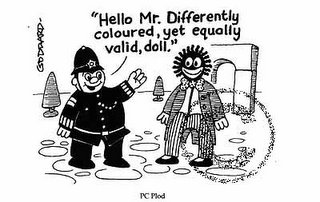 There are many good discussions at Orkut the last days, so let's post one here once more, about my "favourite" subject, racism. An Orkuter from Pakistan asked about the birth of racism. An American Orkuter replied that he found that a useless question and that he thought that such a topic could only lead to pseudoscience and misconceptions. He said the best would be to leave it to professionals, and he posted a link to an article: http://www.news-medical.net/?id=10415.
There are many good discussions at Orkut the last days, so let's post one here once more, about my "favourite" subject, racism. An Orkuter from Pakistan asked about the birth of racism. An American Orkuter replied that he found that a useless question and that he thought that such a topic could only lead to pseudoscience and misconceptions. He said the best would be to leave it to professionals, and he posted a link to an article: http://www.news-medical.net/?id=10415.I replied to him:
So what exactly do you not want us to talk about? I think that discussions about racism shouldn't be left to professionals only (who are these professionals that they would know all about it, by the way). It's all very interesting what the medical professionals in the article say about where prejudices are located in the brain, but that is in my opinion not the core of the problem of racism. Everyone has got prejudices, that's normal and doesn't have to be negative, it's just a way to make the complex world around us more understandable for the mind. Among the many prejudices that exist there are some which are harmful, however, these are the prejudices which are part of a belief system that different races have different characteristics, that they apply for all members of these groups, that they are unchangeable (people are imprisoned in it, determined by their fate) and that they are not equal, that your own race is superior to a different race. And it's also possible that the superioriy / inferiority judgement is not specifically based on race but e.g. on culture. When culture is assumed to be just as unchangeable as race it has the same negative consequences as "real" racism.
Do you admit that this phenomenon exists? That somebody considers his own race as superior to a different race? It's a very dangerous thing because when humans aren't considered to be equal, there isn't any moral ground available anymore to stop terror against humans. Then they can be made slaves, their human rights can be taken away completely, they can be treated as dogs or less. You don't need to be a professional to understand that problem.
I don't find it very important to trace back the first recorded case of racism, I think it's a problem of all times and places. I am not so much interested in how racism started in the history, but mostly how it starts at the individual level. What's the difference betwen harmful and non-harmful prejudices? How does it happen that people loose their flexibility and open-mindedness, that when they meet individuals who don't fit with their negative prejudices of that group, that this doesn't influence their general pricture at all? How does it happen that in the end people only see their own inventions / prejudices and don't even notice what the concrete people they meet are like? How does this work, the process of dehuminazation? How is it possible that people were brought to gaz chambers, how is it possible that people do such terrible things to each other in wars, to innocent children and women? This isn't necessarily racism of course, but just like racism, it's a process of dehumanization. If people would regard the others around them as equal human beings they could never do such awful things to each other, I think. And that's the main thing that has to be done to stop racism I think, to stop the dehumanization process and to repeat each time that all races and cultures are equal with regard to the "humanness". We are all completely human and we should always treat each other like that. In my view racism is not about biological differences between races. Racism is about one race considering another race as inferior. And instead of race the inferiority can also be based just on culture, religion etc.
Definition of racism according to Cambridge dictionaries online: The belief that people's qualities are influenced by their race and that the members of other races are not as good as the members of your own, or the resulting unfair treatment of members of other races.
Racism is just a belief, the belief doesn't have to be based on anything, real biological differences between races are irrelevant. They may exist but they cannot make one human inferior to another human in my view.
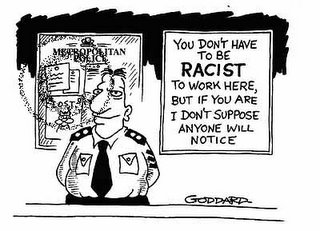 The American Orkuter said:
The American Orkuter said:Esther, some populations are on average better at some functions then other populations. This doesn't imply an overall "superiority" or "inferiority" at all. If someone has an irrational hatred of all people identified as a "race" then that person is a racist, but if that person recognizes the medical fact of skin cancer risk in northern europeans, or malaria risk for that same population, that person isn't a racist, but simply someone who understands the reality of human bilogical differences. "Racist" implies irrational hatred. Recognizing racial differences doesn't make a person a racist, it just means that that person has pattern recognition.
I said:
I totally agree.
- Irrational hatred -> racism
- Recognition of biological differences with regard to certain features -> not racism.
So the belief that a certain race as a whole is inferior to another race, accompanied by irrational hate, and which is used to justify oppression, discrimination and exclusion, is a phenomenon which can be described as racism. And this is a very dangerous and harmful phenomenon that we should try to stop. The question of where the birth of this phenomenon comes from is an important one (with the related questions I asked), isn't it?
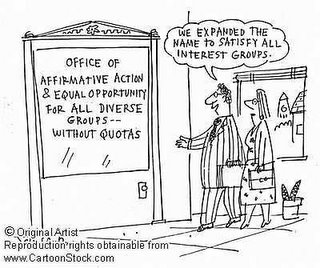 Orkuter said:
Orkuter said:Good. We're on the same sheet of music here. Now, since you admit that there are different statistical appearances of certain traits in certain groups, one will also agree that one group is more likely to hold to a certain pattern of performance at a certain task (eg. sun resistance) than another group, yet there are always the statistical anomolies within each group, those at the extremes of the bell curve. This gives me a moral question: Given that any individual from a certain group could possibly perform any given task just about anywhere along the bell curve, anywhere along the full spectrum of function for that task, one must treat each individual equally, recognising that such an individual regardless of the average performance of his group at that task, could himself perform above or below that group average. Now, given that we treat all members of a group equally, inequality will form. Not all people are equal, and statistically more members of one group will perform a task better then members of another group depending on the task and the group. My given example will be the Korean War Frostbite Study discussed earlier. If we treat all members equally, we must accept that some groups will experience a higher rate of success, while others have a higher rate of failure based on that groups average performance along the bell curve for that perticular task. We see that with exactly equal treatment, exactly the same training, exactly the same equipment, and exactly the same environment and opportunities that "The Negro was proven to be at greater risk of attack by frostbite (six times) when all environmental factors were equalized. At regimental level his rate was 35.9 per 1,000 as compared to 5.8 per 1,000 for the white soldier. Negroes had more severe degrees of frostbite than did the whites."
Now, given exactly fair treatment, without any institutional racism, one must accept a different average outcome for different groups. Some of the white soldiers also get frostbite under these conditions, but five times as many black soldiers get frostbite, and much more severe cases.
My question: Is it more important to treat people as equals, and accept the results of individuals as more important then as group function, or do we accept people as members of a group, and try to give special help to members of a group that is deemed inferior at a certain task?
I will give you my answer below, but I also expect your answer.
My answer to my above question
I believe that individuals fit into groups, and statistically will fail or succeed according to the statistical averages of that group. This is a fact. I also believe that it is none of the gvmt's business how a group behaves, since it is not within the gvmt's responsibilities or capabilities to alter the biology of a group. Throwing money at a problem doesn't solve it and creates more inequality. Treat individuals as just that: Individuals. Each individual is to be recognized by the state as a member of only one group, that group being 'citizens' of the state. All citizens will then, of course, fit into an average for the entire population and be treated fairly as individuals. If the government attempts any sort of corrective measure, it should be applied across the entire population equally, as in the case of the frostbite injuries in Korea. All US Soldiers, regardless of race or whether they were from Minnesota or Mississippi were given better cold weather training in order to prevent cold weather casualties. Though only a small portion of the Norwegian kids from Minnesota were getting frostbite, no doubt that number was reduced, as would be the target group of blacks from Mississippi.
 I said:
I said:"Now, since you admit that there are different statistical appearances of certain traits in certain groups, one will also agree that one group is more likely to hold to a certain pattern of performance at a certain task (eg. sun resistance) than another group, yet there are always the statistical anomolies within each group, those at the extremes of the bell curve." No I don't agree with this. There will be differences in how different races or group cultures perform in certain fields and this leads to inequality. You want to justify this inequality on the basis of the differences in capacities of these groups. But in the first place I think that differences in capacities are not the only source of the inequality, there are also mechanisms which increase existing inequality, which is not the fault of the group that doesn't perform so well. And even if it's partly their own fault when people are poor, I still think that rich people who have the means should try to help them to develop. The question was: Is it more important to treat people as equals, or do we accept people as members of a group and try to give special help to members of a group that is deemed inferior at a certain risk? My answer: People should be treated as equals, always. But this doesn't mean that we cannot help people who need help. We don't have to give special help to certain "risk groups", there isn't any reason for that and then you could start to help people who don't need help (because the group is not homogenous). You don't have to look for the colour of ones skin, his ethnicity, the culture or religion, and what the statistical performance is like in these categories compared to other categories. You just help people who need help, independent of their background. Long term unemployed people can get some help to follow more education and to find a job, for instance by starting with an internship. When the unemployment rate in the Netherlands is much higher among Moroccans than among the Dutch, it means that relatively more Moroccans will take part in such a programme. But it doesn't mean that a special programme should be created for Moroccans...
2/20/2006
Western arrogance - continued...
 Here's another part of an Orkut discussion in reaction to my post about western arrogance...
Here's another part of an Orkut discussion in reaction to my post about western arrogance...An Orkuter said:
Esther, my apologies, but I've read through your comments several times now and I'm having trouble understanding quite what you're saying. Apparently it all comes down to "intercultural competences" and an appeal to us all to just get along. Why, then, the title "Western arrogance" ? Are we somehow alone or highlighted for special treatment? I can't help thinking that your real "face-to-face" is between your intellect and your conscience. It is therefore unfortunate that you won't find Derrida give a moment's notice to the latter. Then you wouldn't be confused about appropriate action. I think Levinas would go down a treat with Hamas. Why don't you send them a few copies?
I replied:
No, no special treatment for Westerners. And if my "face-to-face" is only between my intellect and my conscience then something is very wrong. For Levinas a "face-to-face" is always a face faced with the totally other, not just with itself.
I wrote about "Western arrogance" because I read so little about that in the media and I hear so little people criticize that side of the story. This while there's a lot of attention for "Eastern arrogance", or the way in which a small group of extremist Muslims think that they can take over the world with a fundamentalist Islam and who think that they have the right to use extreme violence against all kind of people who don't have anything to do with it when some cartoons against the Islam were made - this form of arrogance is being criticized all the time. I wanted to point out a different form next to that.
If the Hamas would listen to what Levinas said it would be very good (not really realistic idea). That's the main problem with Levinas, if the whole world would read all his books and understand it, it would have a considerable positive effect on ethical behaviour in the world. But very few people read everything and understand it. If people would be focussed on ethics as much as Levinas this would certainly help I think.
Intercultural competences, open-mindedness, willingness to meet the totally other, trying to come closer to each other, it's always something that has to come from both sides.
So indeed Muslims have to accept that at the other side of the world some traditions of satire exist which are offensive for them, but which are an essential part of the Danish culture and so which in principle should be respected by Muslims. And at the same time the Danish journalists should have realized what the effect of their actions would be for others, they should have realized that the cartoons would be considered as much worse in another culture than they consider it themselves.
Maybe the reason why I criticize Western arrogance more than Eastern arrogance is because the culture of the West is my own culture. I see this around me all the time and I get tired of the arrogance.
All this shouting for freedom of speech and so little attempts to put oneself in the shoes of a Muslim to imagine how it would feel then.
It's also with regard to the multicultural society. I spoke with a friend about the growing polarisation and he said: "I just think that immigrants should assimilate more." It's so easy then for the natives, you don't have to do anything, you just force the immigrants to assimilate.
I am strongly convinced that intercultural contact / cooperation / living together is only possible when all different groups try their best for that. I also read a newspaper article titled: "Are the immigrants really willing to integrate?" It's an important question of course, but it's not the only question which counts. A question which is just as important is: "Are the natives willing to accept strangers in their society?" And to accept means to count them as full citizens and to accept that they are totally different from us, and that they will remain different even when they try to learn Dutch as soon as possible and when they learn about the Dutch standards and values and habits and when they obey to the law.
I don't want to turn it around and make it a one way street in the other direction, but because the views are in my opinion unbalanced at this moment, I focus on the side which doesn't get enough attention in my opinion.
2/15/2006
Danish cartoons revisited
 Sorry, again another post related to the Danish cartoons...
Sorry, again another post related to the Danish cartoons...Until now I didn't pay much attention to the embassies that were put on fire and other violence used by Muslims as a protest against the cartoons. I found it very bad and worrying that these things were happening, but I didn't find it very interesting for the political and ethical debate, because it's very clear that it's bad and there is not so much to say about it for the rest. I expected that it wouldn't take long anymore before these outbursts would calm down. But I was wrong...
A Palestinian friend from Orkut (Muslim) who lives in Pakistan sent me this link: http://www.dailytimes.com.pk/default.asp?page=2006\02\15\story_15-2-2006_pg1_1
In this way it becomes harder for me to support the Islam as a peaceful civilized religion. The facts of what is happening now don't seem to support the things I say about the Islam and Muslims. The situation is still that most Muslims in the world are moderate and peaceful, but the great amount of violence which can be seen at many places in the world now doesn't improve the reputation of the Islam...
Danish cartoons - continued...

It is strange to see what some (simple) drawings can lead to in this globalized world. I don't think it happened before that the publishment of some cartoons in a magazine lead to such enormous waves of reactions. So in this third post related to the Danish cartoons in this blog, I would like to post some more reactions that were posted at Orkut, in reply to my text about Western arrogance. At the end of this week I will also add part of an online philosophy discussion (in Dutch) about this topic.
Here's a list of some of the main comments that were made:
- Orkuter 1 says: I agree that danish news paper should not have published that article. But the problem is not only this. There is serious problem with followers of Islam. wherever they go, they create problems. wherever their population is more, they create problems to minorities. Wherever they become sufficient in number they starts demanding for seperate country.Tolerance is good. But it should come from both sides. Why it should be preached only for other communities when the real culprits are Muslims. One can easily see in case of Pakistan, Bangladesh, how minorities are being treated there. In India itself, in whatever parts they are in majority they create problems. In Kashmir, they are in majority and they tortured hindus there nad hindus had to leave kashmir and now hey are living in camps in Delhi. They are living like immigrants in their own country!! There is surely something wrong with how muslims treats others. Whatever you call it, you may say that not all muslims are terrorist or whatever...I am not saying that all are terrorists but my question is that why is that muslims always creates problems to others in society? Why they torture other communities whenever and wherever they can do so? My opinion is that those who will not oppose strongly to such tendency, they will pay the price one day or the other as even if you are tolerant, they are not going to be like that. Though I do believe in humanity but I can not support tolerance to those who are intolerant. If they will not have strong opposition world over they are not going to understand what tolerance is. It is not about those cartoons. I remember that some years ago..one of Muslim painter made nude photos of a Hindu goddess then for these Muslims, it was matter of freedom of expression. It was Afghanistan where they demolish all the buddhist idols..where was the respect for others? One can not built a temple in Banladesh, where is the respect for oher religion in Islam?
- Orkuter 2 says: 1. I do not think that 'Islam creating problems for minorities' is generally applicable - and therefore attributable to Islam - at all. Pardon my inability to manipulate history to my own purposes and enumerate examples, but Salahuddin Ayyubi ("Saladin") is a good example - of a benevolent ruler and pious Muslim. Yes, there were difficult times for non-Muslims, too. There is no doubt that minorities (whether Hindu or Muslim or Christian or Ahmedi/Qadyani) are mistreated in the sub-continent – India being no exception, in this regard. But I beg you to not forget the Hindus and Muslims (the two largest communities) in India had been living peacefully with each other before the British colonialist arrived in India. There is a credible theory that the British sought to aggravate Hindu-Muslim differences to be able to manipulate the diverse social fabric of India. Now, I am not going to put the blame on the British for problems today. It is, no doubt, our failure, as South Asians, to not be able to ensure communal harmony in our localities. But I strongly feel that blaming one community or the other for inciting hatred or promoting intolerance is NOT the solution to any problem. Such a generalization is likely to aggravate member of that community – tolerant or not. Instead, given our common origin as Indian (and neglecting the North-South distinction), our understanding of our differences with each other, is it not inevitable that either we all completely kill each other or live peacefully. Honestly, I’d rather die struggling for the later. And it doesn’t matter at whose hand – Muslim or Hindu – as long as that hand shall affirm that it is Indian.
- Esther says: "But the problem is not only this, there is a serious problem with followers of Islam. Wherever they go, they create problems." I propose to change this text in a more specific defined one:"There is a serious problem with the extremist followers of the political Islam."For them this counts, but not for moderate and peaceful Muslims (the majority).
- Orkuter 1 says: If minorities are being tortured in your countries (Islamic countries) and you say that only few extrimists are responsible for that. If majority muslims population believe in peace (as you say that Islam means peace). But if minorities in your countries are being tortured and majority of muslim community just watching that and not doing anything. In my views they are also equally responsible. If majority of muslim population believe in peace then donot allow Islamic rules in your countries as other communities are also living there...why to force Islamic law on those who donot believe in Islam? Is it tolerance ad believe in peace? There is problem and you, majority of muslims, (who claim that they believe in peace) have to deal with it. Otherwise you will also suffer as well as the rest of world.
- Orkuter 3 says: If the law of a country, as in the case of these European nations, allows such publication, then it is a law that needs to be amended. This debate is not so much about subjective civil values that countries like Denmark hold in high esteem, as it is about acknowledging others’ values. It is not enough that these countries pass legislation against racial discrimination, slander or incitement to violence — for some of us blasphemy laws are equally important!
- Orkuter 4 says: I disagree because when it comes to freedom of speech the liberals and the West should not sacrifice their values one inch to those who seek censorship on religious grounds, whether Evangelists, Catholics or Muslims or whoever.But I would partly agree with you that the right to freedom of speech equates to neither an obligation to ofend nor a duty to be insenstive to people. There has never been any contradiction between supporting someones right to do something and condemning them for doing it. The right to offend must come with at least one consequent right and one subsequent responsibility. If newspapers have the right to offend then surely their targets have the right to be offended as Muslims surely have been.
- Later in the discussion, Orkuter 5 says: Muslims are indeed submitted to discrimination in Europe, and their religion far too often associated with terrorism. That is why the cartoons were so offensive – not because they were true, but because they seemed true. They joke with a real issue. I am all pro freedom of speech, but the motivation behind the Newspaper was hateful. The cartoons brook a Muslim taboo not in defense of Human Rights (as Theo Van Gogh´s films), but simply as a provocation. A way to shout: here your beliefs don’t rule. As for “sense of humor”, here's an example: It offends me to hear racist jokes against black people, northeasterners and other social groups that are indeed discriminated. I can find humor in the anti-Portuguese jokes very common in Brazil though. Not because I don’t like Portugal or its people, but simply because the gags aren’t based on real hardships. The police don’t mistreat Portuguese teenagers here. Portuguese don’t hear their hair is “bad”. Portuguese don’t learn their regional variations of speech are incorrect and ridiculous. Portuguese are not portrayed as cleaners and housekeepers in elementary school books.
- Orkuter 6 says: I agree. It seemed to me that the Danish newspaper took advantage of the Freedom of Speech principle to insult directly a minority whose identity is on the spot, specially those who live in Europe. The publisher did know that the Muslim community would feel insulted and did predict how they would react. Not taking these facts into consideration impplies a level of naïfness not expected in a publisher afterall, and I really think that is not the case. There is another tiny - almost unconscious - unuterred truth behind the *harmless tricky* charges: we are talking about a newspaper, a press coorporation. We are referring to people who care about their money. They don't want to ruin their business at all so they are really careful about what is being published. Therefore if a scornful charge appears on the news it means that it has been previously authorized by someone who wants give what their readers want. Among other things,they want something funny to laugh at and that *so called prophet*, who is so precious to those Muslims, serves the purpose. It means that Muhammad is laughable and so are the Muslims and the Danish population dont give a damn about either their culture or values. I think this is where the problem relies.Finally I'm not stating that this is faithfull to the major Danish opinion. I'm concerned about what an atittude impplies. Thus I imagine - and probably so does the Muslim community - that a publisher's decision is concerned about their readers, which happens to be the harmful assumption.
- Esther says: I agree. I am surprised how little the people I speak to in my surroundings are willing to put themselves in the shoes of Muslims. We had a discussion during the lunch break at my work and people were only making sick jokes themselves about both the Danish cartoons and the holocaust jokes. I hear people say so often that immigrants / Muslims should adapt to "our culture" and that it's stupid that they get so angry and don't have any sense of humour and that they would have a violent and backward culture or something. And when I defend the peaceful Muslims who felt insulted they look suspicious at me as if I could say anytime that I converted to Muslim. People think simplistic, completely locked up in their own perspective / background of atheism, irony / cynism, indifference, and casualness. They think that because they wouldn't really care if jokes were made about what they find important, Muslims shouldn't care either, and certainly not if it's about something THEY don't find important. Always the emphasis on assimilation of non-natives, very little recognition of the fact that in cultural diverse societies and in a globalised world, everybody needs intercultural skills to be able to understand each other and live together. Everyone has to do some efforts to understand people who are completely different, to respect them and to accept differences. Not as a way of giving up your own identity, just as a way to improve communication and cooperation.
2/07/2006
Western arrogance
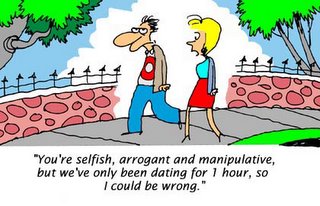 The case of the Danish cartoons is a very interesting one for discourse analysis in relation to intercultural contact. Yesterday at once the Internet discussions seemed to burst out everywhere: at different places at Orkut, at my weblog, in a philosophy discussion list that I’m a member of and at msn (but that was before).
The case of the Danish cartoons is a very interesting one for discourse analysis in relation to intercultural contact. Yesterday at once the Internet discussions seemed to burst out everywhere: at different places at Orkut, at my weblog, in a philosophy discussion list that I’m a member of and at msn (but that was before).
It is strange I think, that at once the phenomenon that I have been protesting against all the time seems to be popping up everywhere. The phenomenon I refer to is the process of dehumanization of the other, the stranger, as described by Levinas, a process which is in this case caused by phenomena like racism, xenophobia, bigotry, fear and hate and which shows itself through simplistic generalizations, exaggerations, irrational anger, aggression, discrimination, exclusion, and immorality.
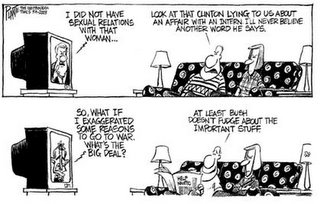 This process is happening at “both sides” – both with non-western Muslims and Western non-Muslims. The broad reaction of anger and the threats with violence are clearly being noticed by “the West” and they are strongly being rejected, which is logical and good. But what fascinates me is that I almost don’t find any attempt to nuanced critical reflections, modesty and self-criticism in the West, in the discussions I have read so far.
This process is happening at “both sides” – both with non-western Muslims and Western non-Muslims. The broad reaction of anger and the threats with violence are clearly being noticed by “the West” and they are strongly being rejected, which is logical and good. But what fascinates me is that I almost don’t find any attempt to nuanced critical reflections, modesty and self-criticism in the West, in the discussions I have read so far.
I noticed a kind of obsession for an unlimited freedom of speech, based on a fear that non-Westerners are going to determine for us what we are allowed to say and do and what not. A fear that in the future we will no longer be able to say what we think. A fear that if you decide to take others into account with what you say, you would restrict yourself too much by not always saying exactly what you think. Somebody said that when you respect others too much, in the end a situation will arise in which nobody speaks with another anymore at a fundamental level. The idea behind it seems to be that these “stupid backward” Muslims should finally adapt our “developed sense of humor”, because it became high time that they would understand that our jokes are intelligent and innocent and that they stop with their barbarian violent resistance against that.
 The discussions are soaked with an arrogant Western feeling of superiority, in my view, as if we have a more developed “sense of humor” and in fact a “more developed sense of whatever” and that if the non-Westerners don’t assimilate very fast, they had better “leave our countries, if they don’t like it here”. (I am using quotation marks not because I am quoting someone but to show that this is not my personal opinion.) “Long live the cultural differences” was said in a discussion, but it seemed to be aimed merely at stopping the Muslims from their “stupid complaints against our civilized forms of behavior and expression”. Acceptance of differences again only as a one way street, from the other side, the Western side, there is only the demand of complete assimilation by the non-natives. This underlying Western arrogance is often located at an unconscious level I think, people wouldn’t really say directly that they consider the Western culture to be superior.
The discussions are soaked with an arrogant Western feeling of superiority, in my view, as if we have a more developed “sense of humor” and in fact a “more developed sense of whatever” and that if the non-Westerners don’t assimilate very fast, they had better “leave our countries, if they don’t like it here”. (I am using quotation marks not because I am quoting someone but to show that this is not my personal opinion.) “Long live the cultural differences” was said in a discussion, but it seemed to be aimed merely at stopping the Muslims from their “stupid complaints against our civilized forms of behavior and expression”. Acceptance of differences again only as a one way street, from the other side, the Western side, there is only the demand of complete assimilation by the non-natives. This underlying Western arrogance is often located at an unconscious level I think, people wouldn’t really say directly that they consider the Western culture to be superior.
I think this is a very bad and dangerous development. So I think – in short – that in the first place these cartoons should not have been published and in the second place Islamic extremists should not have overreacted with (threats of) extreme violence. But finally the Western overreaction to the Eastern overreaction is no good either, and so it should stop.
Polarization, hate and animosity between non-Muslim Westerners and Muslim non-Westerners doesn’t bring us anywhere. It’s a fact that many European societies are culturally diverse, including a big Muslim population. They belong in Europe and they won’t leave altogether, so they should not be excluded but be counted as full and equal citizens. In a society with many different cultures you have to take other cultures into account. This means that the issue at stake is not just that immigrants should adapt to the dominant culture, it also means that natives have to accept that they live together with people with a different background and value system. Taking other cultures into account doesn’t mean that you give up your own culture, it just means that you think about how you express yourself towards others, that you try to avoid unnecessary insults. That should be not so much to ask I think, as a basic form of universal politeness. It should be not such a difficult thing to do for the so-called “civilized” West, I would think.
2/06/2006
Danish cartoons and individual responsibility
Pictures of God are rare as well within Christianity

I would like to give my comments with regard to the topic of the Danish cartoons.
I agree with those who say that it doesn't make sense to organise big demonstrations at the other side of the world against some drawings that were made in a small magazine in a small country in Europe, and the threats with violence, as a revenge, are ridiculous. It's logical that Muslims in Denmark and Europe as a whole are angry, but Muslims from other parts of the world shouldn't have made such a fuss of it, I think. They honour the Danish journalists too much by paying so much attention to them.
On the other hand I don't agree with those who say that the journalists made those drawings as a noble act to defend the freedom of speech. I think they shouldn't have published these drawings. I don't say that state censorship should be introduced to stop the publication of such cartoons. When you use state censorship against these practices, the cure is worse than the disease. Of course complete freedom of speech should always be maintained. Everybody should be allowed to say everything he or she likes, but the question is if everything that can be said, should really be said. In my opinion this is a matter of individual responsibility. Every individual is responsible for his or her own actions. What we do and say leads to certain consequences and we are responsible for that. The Danish journalists made drawings which are offensive to the Islam as a whole. Drawings of the Prophet should never be made, and certainly not in such a disrespectfyul way. Why would they do that? Why can't they leave the Islamic religion in peace? Why should the followers of a certain faith be attacked with insults unnecessarily?
People should think well before they do such things. For most Europeans this kind of satire will be considered as innocent, but for most Muslims it won't be like that. Actions like this contribute to increased polarisation, because big groups inside and outside of Europe feel seriously offended and when they become very angry, this leads again to more agression and hate at the other side as well. I think these developments are bad for everybody, so it's something which shouldn't be stimulated.The reason not to do it is not out of fear for revenge from the Islamic world, threats to cut of heads, coming from the other side of the world should not change our behaviour in the west, that's our own business. The only reason should be that we consider it bad to attack / insult a different culture / religion unnecessarily. It's very well possible that some forms of behaviour in the western culture are offensive to Muslims and that doesn't mean we should stop with that kind of behaviour, it's only because these cartoons are deliberately meant as an attack to the Islam that I think they are bad. And if these cartoons where meant to criticize certain aspects of the Islam, if it was meant to start a constructive but critical intercultural or interreligious dialogue I would also approve of it, but these cartoons don't contain any critical reflections, they are either meant to insult or as a joke, but not as a serious form of criticism.
2/03/2006
Onvoorwaardelijke aanvaarding en de zorg voor het zelf
 Graag wil ik terugkomen op twee (gerelateerde) onderwerpen vanuit de Derrida-leesgroep, waar ik al eerder over schreef: onvoorwaardelijkheid en de zorg voor het zelf.
Graag wil ik terugkomen op twee (gerelateerde) onderwerpen vanuit de Derrida-leesgroep, waar ik al eerder over schreef: onvoorwaardelijkheid en de zorg voor het zelf.
Een toelichting bij deze punten:
De docent / begeleider van de leesgroep had mij gevraagd of Levinas ooit iets geschreven heeft over de “zorg voor het zelf”, of dat Levinas met al zijn aandacht voor de ander, van het zelf verwacht dat het zichzelf volledig wegcijfert.Volgens Derrida (en ook volgens Levinas) betekent echte gastvrijheid totale onvoorwaardelijke gastvrijheid. Als gastheer zet ik de deur altijd wagenwijd open voor wie dan ook. Sommige mensen in de leesgroep vonden dat deze vorm van onvoorwaardelijke gastvrijheid in de praktijk niet realistisch is, het betekent dat je deur wordt platgelopen en dat je de meest vreselijke mensen op ieder moment in je huis moet binnenlaten en dat ze misschien nooit meer weggaan. Een huiseigenaar heeft toch ook recht op privacy en moet toch zelf kunnen bepalen wie hij wanneer binnenlaat… Nadat geconcludeerd was dat het onzinnig was om te streven naar totale onvoorwaardelijke gastvrijheid, vroegen mensen zich af waarom Derrida toch steeds het belang van de onvoorwaardelijkheid benadrukt, waarom zou je steeds refereren aan zo’n onbereikbare utopie?
De laatste dagen ben ik veel aan het lezen in Levinas’ Talmoedische studies. Ik vind dat hij het “humanisme van de andere mens” daarin veel duidelijker en concreter omschrijft dan in zijn meer abstract filosofische teksten. In de talmoedles “De verzoeking van de verzoeking”, in “Vier talmoedlessen” schrijft hij over onvoorwaardelijkheid, en aan het einde van de les zegt hij ook iets over de zorg (bekommernis) voor het zelf.
De verzoeking van de verzoeking – dit is de bespreking van een tekstfragment uit het traktaat “Sjabbat” - gaat over hoe God de Israëlieten voor de “keuze” heeft gesteld om de Tora wel of niet te aanvaarden. God boog een berg over hen heen en zei:
“Als gij de Tora aanvaardt, des te beter, zo niet, dit zal hier uw graftombe zijn.” (p.54)
Levinas begint te zeggen dat het lijkt alsof God de Israëlieten onder druk zet om de Tora te aanvaarden, door te dreigen dat de berg anders hun graf wordt. Hij zegt: “Een fraaie situatie voor de uitoefening van de vrije wil: een zwaard van Damocles! De keuze voor de Joodse bestaanswijze, zou een keuze zijn tussen die bestaanswijze of de dood."
God verwacht van de Israëlieten dat zij zich onvoorwaardelijk en onmiddellijk aan de Tora verbinden. Toch is er daarbij volgens Levinas geen sprake van dwang of onderdrukking. Het gaat niet om een keuze die aan de Israëlieten wordt voorgelegd waarbij ze eerst een onderzoek naar de voor- en nadelen kunnen doen, waar ze even rustig over nadenken en er dan een standpunt over innemen. Het is ook niet zo dat God beveelt en de Israëlieten blindelings gehoorzamen. In deze situatie is er aan de ene kant geen sprake van een totaal vrij en redelijk keuzeproces, maar aan de andere kant ook niet van dwang en dreiging door God. God heeft “in den beginne” een verdrag gesloten; als Israël de Tora aanvaardt, blijft het bestaan, zo niet, dan wordt
 het tot chaos herleid. Het verdrag is niet gesloten met instemming van de mens, toen God die beslissing nam was er nog geen mens die kon kiezen. Toch is het een verdrag tussen God en mens waar God aanspraak op maakt. Een verdrag dat voorafgaat aan keuzevrijheid en de rede, maar ook aan totalitaire dwang en dreigementen.
het tot chaos herleid. Het verdrag is niet gesloten met instemming van de mens, toen God die beslissing nam was er nog geen mens die kon kiezen. Toch is het een verdrag tussen God en mens waar God aanspraak op maakt. Een verdrag dat voorafgaat aan keuzevrijheid en de rede, maar ook aan totalitaire dwang en dreigementen.En de Israëlieten verbonden zich ertoe te doen alvorens te horen… Eerst het doen, dan het horen. Israël wordt vergeleken met een appelboom (cederappels) waarbij de vruchten vooraf gaan aan de bladeren, zo heeft Israël zich ertoe verbonden eerst te doen en dan te horen.
Levinas maakt een uitgebreide analyse van wat hiermee bedoeld zou kunnen worden. In feite betoogt hij dat dit de kern is van onvoorwaardelijke aanvaarding: eerst te doen en dan pas te horen of te denken, en dat dit de enig mogelijke vorm van werkelijke aanvaarding is. God vraagt de Israëlieten te doen alvorens te horen en de Israëlieten verbinden zich daaraan. Er wordt gehandeld voordat er wordt nagedacht. Daarmee lijkt het of er spontaan en naïef gehandeld wordt, je doet al iets voordat je daar over nagedacht hebt. Alsof je zomaar wat doet, gedachteloos. Alsof je op een kinderlijke manier ergens inspringt zonder te weten waaraan je begint. Toch is daar volgens Levinas geen sprake van. De omkering van de normale volgorde - eerst denken en dan doen, duidt een overschrijding van het weten aan. Het is een vorm van handelen die niet op onwetendheid gebaseerd is maar op een weten dat niet voortkomt uit de calculerende nadenkende rede die normaal gesproken aan een beslissing of handeling vooraf gaat.
In het verlengde hiervan zegt Levinas dat deze vorm van onvoorwaardelijke goedheid niet door het kwade ongedaan gemaakt kan worden. Het kwade kan goede mensen als mens kapot maken, maar niet hun oorspronkelijke goedheid. “Wij zullen doen en wij zullen horen’ is niet het resultaat van een keuze tussen goed en kwaad. Zij gaat eraan vooraf. Het kwaad kan deze onvoorwaardelijke instemming aantasten maar het kwaad kan haar niet teniet doen. Het “doen” waarvan sprake is in deze tekst is volgens Levinas niet simpelweg het praktische tegenover het theoretische, maar een wijze van verwerkelijking zonder te beginnen bij de verschillende mogelijkheden, van kennen zonder te onderzoeken. Er bestaat een verbond met het goede dat voorafgaat aan het onderscheid tussen goed en kwaad.
Een appelboom waarbij de vruchten vooraf gaan aan de bladeren. Alles is van het begin af aan al aanwezig. De geschiedenis brengt geen ontwikkeling te weeg maar geeft uitbreiding te zien. De Tora wordt buiten iedere verkenningstocht om ontvangen, buiten iedere geleidelijke ontwikkeling om. Het is de rijpe vrucht die wordt aangeboden en zo wordt aangenomen, het is niet datgene wat zich laat aanbieden aan de tastende en onderzoekende kinderhand.
“Het ware dat zich aldus aanbiedt is het goede dat degene die het ontvangt nu juist niet de tijd laat op verhaal te komen en op onderzoek uit te gaan, welke urgentie niet een aan vrijheid gestelde grens is, maar dat getuigt van een onweerspreekbare verantwoordelijkheid die de aangegane verplichtingen achter zich laat; en daar wordt misschien reeds het volstrekt gescheiden ik, dat pretendeert het laatste geheim van de subjectiviteit in pacht te hebben, weersproken.”
Onvoorwaardelijk wordt het verbond met God aanvaard, zonder dat het nodig is eerst kennis op te doen, een onderzoek in te stellen, argumenten tegen elkaar af te wegen en een rationele en vrije keuze te maken. Er wordt een oproep gedaan en aan de oproep wordt gehoor gegeven. Er wordt gevraagd om actie, om doen, en er wordt gedaan. Dat is de kern van onvoorwaardelijke aanvaarding. Van wie komt die oproep? Uiteindelijk komt de oproep van God, maar God spreekt niet direct tot mensen. Waarschijnlijk is het niet zo moeilijk om te raden van wie de oproep, het appèl dan wel komt: natuurlijk van de ander, de totale ander, die een appèl op mij doet wanneer ik zijn gelaat zie, doordat hij mij aankijkt.
Op dit punt in de tekst geeft Levinas naar mijn mening een heel heldere omschrijving van zijn idee van het humanisme van de ander:
“Een rechtstreekse verhouding met de waarheid – die voorafgaand onderzoek naar de idee erachter uitsluit – kan slechts de verhouding tot een persoon, tot een ander zijn. De Tora wordt gegeven in het Licht van een gelaat. De epifanie van de ander is ipso facto mijn verantwoordelijkheid jegens de ander: het zien van de ander is van meet af aan een verplichting ten opzichte van hem. De rechtstreekse optiek – zonder overdenking van enig idee – kan alleen als ethiek plaatsvinden. De integrale ontvangst van de Tora is ethisch gedrag. Het ja van het “wij zullen doen” kan niet een engagement zijn van doen om maar te doen. Het gaat daarentegen om een helderheid, oordeelkundig gelijk de twijfel [grappig dat de twijfel sterk oordeelkundig is volgens Levinas], maar geëngageerd gelijk het doen, een helderheid zonder aftasten. Een stem horen die tot je spreekt is ipso facto de verplichting aanvaarden jegens degene die spreekt, de ander. Het verstaan begint niet in de zelfverzekerdheid van het ik, het verstaan is een trouw aan de waarheid, integer en voorafgaand aan ieder menselijk avontuur. Het bewustzijn is de dringende roep van een bestemming die tot de ander leidt, en het is niet de eeuwige terugkeer tot zichzelf. Maar het “wij zullen doen”sluit het “wij zullen horen” niet uit. De voorafgaande trouw is geen naïviteit: alles in haar kan en moet gesprek worden, een boek dat discussies oproept (de Tora). Onvoorwaardelijke aanvaarding betekent onschuld zonder naïviteit, een oprechtheid zonder onnozelheid, absolute oprechtheid, die ook absoluut zelfkritisch is, gelezen in de ogen van degene op wie deze oprechtheid betrekking heeft en wiens blik mij ter discussie stelt. Beweging naar de ander die niet terugkeert naar zijn plaats van herkomst zoals vermaak dat doet, onmachtig tot transcendentie. De integriteit, genomen in de logische betekenis en niet als kenmerk van een kinderlijke aard, schetst, wanneer men haar ten einde denkt, een ethisch model.”
Hier worden de belangrijkste kernbegrippen van Levinas’filosofie - onvoorwaardelijkheid, doen voor denken, de oproep die uitgaat van de ander, verantwoordelijkheid, mijn verplichtingen voor de ander, integriteit en transcendentie – samengebracht in een korte heldere tekst. De mens is een ethisch wezen, een wezen dat onderscheid kan maken tussen goed en kwaad en dat het goede kan doen en begrijpen. Maar een mens kan dat niet alleen, een mens heeft daar altijd de ander voor nodig, de ander die mij aankijkt en wiens blik mij ter discussie stelt. Ik ben verantwoordelijk voor hoe ik de ander behandel, en de ander maakt daar aanspraak op. Alleen de ander kan dat op die manier doen, dingen kunnen dat niet, dieren niet, ik kan dat niet doen naar mijzelf toe, en God ook niet. Dus het is het contact tussen mij en de ander dat onze relatie ethisch maakt en ook religieus. Doordat de ander mijn egoïstische zelf openbreekt kan ik zien dat er meer is dan dat, oneindig meer, ik kan boven mij uitstijgen en dat meer waar ik iets van waar kan nemen / beseffen, dat is God zelf. Het maakt niet uit wie de ander is die mij wakker schudt, ter discussie stelt, mij oproept mijn verantwoordelijkheid op mij te nemen en mij bevrijdt. Iedere “ander” kan die rol vervullen. Aanvaarding van goedheid en verantwoordelijkheid kan alleen onvoorwaardelijk zijn, onafhankelijk van wie de oproep doet en onafhankelijk van wat voor baat ik daarbij zou kunnen hebben.
Met onvoorwaardelijke gastvrijheid werkt het ongeveer op dezelfde manier. Een vreemdeling doet een beroep op mijn gastvrijheid en ik geef die onvoorwaardelijk, direct. Ik hoef zijn naam niet te weten, ik hoef niet na te denken of ik wel genoeg eten voor hem in huis heb als ik hem binnenlaat, de vreemdeling spreekt mij aan op mijn verantwoordelijkheid en ik neem die op mij. Gastvrijheid is alleen echte gastvrijheid als het onvoorwaardelijk is. Ik “doe” voordat ik hoor of denk.
Inmiddels zijn we bij het einde van de “verzoeking van de verzoeking” tekst aangekomen en daar schrijft Levinas over de bekommernis over het zelf:
“Mijn verantwoordelijkheid voor allen kan zich stellig ook manifesteren in een beperking: het kan in naam van deze onbeperkte verantwoordelijkheid geroepen worden zich ook om zichzelf te bekommeren. Het feit dat ieder ander, mijn naaste, ook “derde” is in vergelijking met een ander die ook naaste is, noodt mij tot gerechtigheid, tot afweging en nadenken. En de onbeperkte verantwoordelijkheid, die deze zorg voor gerechtigheid voor zichzelf en voor filosofie rechtvaardigt, kan vergeten worden. In dit vergeten wordt het egoïsme geboren. Maar het egoïsme is het eerste nog het laatste. De onmogelijkheid aan God te ontsnappen is het “wij zullen doen en wij zullen horen”. Dit ligt besloten diep in het ik, voor wie het zijn niet slechts de mogelijkheid van de dood is maar ook de mogelijkheid van de geboorte van een zin in de botheid van het zijn."
Dus bekommernis over het zelf wordt als een beperking gezien en de zorg voor het zelf wordt op zich wel gerechtvaardigd door mijn onbeperkte verantwoordelijkheid (niet alleen voor die ene ander die voor mij staat), maar brengt tegelijkertijd het risico met zich mee dat ik door mijn zorg voor het zelf nu juist diezelfde onbeperkte verantwoordelijkheid vergeet. Ik krijg toch het idee dat Levinas zich niet erg druk maakt over of mensen wel genoeg voor zichzelf opkomen, zichzelf niet te veel wegcijferen etc. Hij maakt zich vooral zorgen of het ongebreidelde totalitaire egoïsme niet wat al te makkelijk de kop op kan steken. Maar dat egoïsme dat de ander tot ding maakt, ontmenselijkt, heeft niet het laatste woord, “wij zullen doen en wij zullen horen” zal altijd gezegd blijven worden.